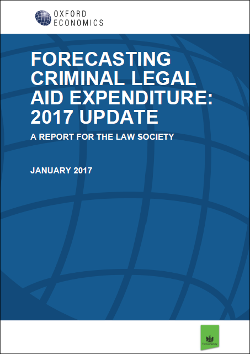Ungated Post | 13 Feb 2017
Forecasting criminal Legal Aid expenditure: 2017 update

The Law Society asked Oxford Economics to refresh its 2014 study to produce forecasts of criminal Legal Aid expenditure under alternative scenarios. A number of factors could affect Legal Aid expenditure over the next five years, including the volume of Legal Aid claims, the impact of policy changes, and the composition of the caseload. We produce a baseline forecast which assumes that crime and prosecution rates remain unchanged in future years, and compare this to alternative forecasts which allow crime and prosecution rates to evolve in line with recent trends. Under both alternative scenarios, expenditure falls—by almost £20 million under the first scenario and by £111 million in the second. We have also investigated what could happen to criminal Legal Aid expenditure if recent government reforms prove effective in reducing the time taken (and therefore costs) per case. Assuming a related cost saving of 2.5-5 percent, this could further reduce criminal Legal Aid expenditure in 2021/22 by between £15 million and £34 million, under the various scenarios.
Oxford Economics’ team is expert at applying advanced economic tools that provide valuable insights into today’s most pressing business, financial, and policy issues.
To find out more about our capabilities, contact:
Americas
Diantha Redd
+1 (646) 503 3052
Email
Asia Pacific
Peter Suomi
+65 6850 0110
Email
EMEA
Aoife Pearson
+44 (0)203 910 8054
Email
Related Services

Post
The economic impact of abandoning the WTO
Oxford Economics have been commissioned by the International Chamber of Commerce (ICC) to provide an independent assessment of the economic impact of WTO dissolution. This report details our findings and the assumptions underpinning our analysis.
Find Out More
Post
The economic impact of the sports activities of public service media
This study shows how the sports activities of public service media supported €4.5 billion of GDP and 57,000 jobs across 31 European countries in 2022. The report also highlights wider economic benefits of public service media sports coverage, such as the way in which it leverages sponsorship income for sports bodies.
Find Out More
Post
Global Trade Education: The role of private philanthropy
Global trade can amplify economic development and poverty alleviation. Capable leaders are required to put in place enabling conditions for trade, but currently these skills are underprovided in developing countries. For philanthropists, investing in trade leadership talent through graduate-level scholarships is an opportunity to make meaningful contributions that can multiply and sustain global economic development.
Find Out More